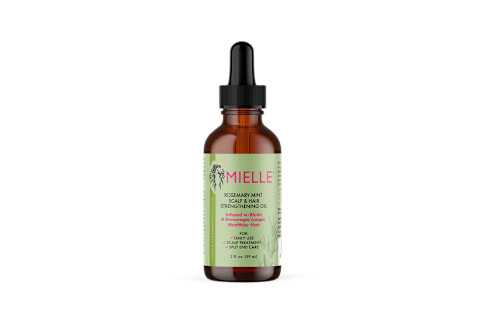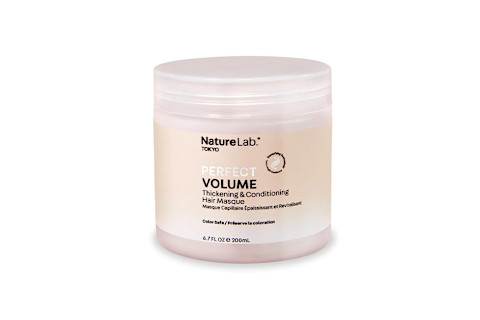Rosemary Is A Hair Growth Hero — But Can You Overdo It?

Of all the buzzy hair care actives making waves (pun intended), nothing will replace rosemary oil as my all-time MVP. I love its natural hair growth properties1, I adore the invigorating scent, I appreciate its versatility… I could go on.
I’m certainly not alone in my affinity for the aromatic herb—you can find it in a host of hair care products on the market, plus a slew of DIY hair care projects on TikTok. (I repeat: Rosemary has range.)
But we forget that rosemary oil is a very potent essential oil. Potent enough to rejuvenate the scalp and stimulate hair follicles, yes, but the intensity can cause irritation if you’re not careful. As I’m washing my hair with a rosemary-infused shampoo, following up with a rosemary oil deep conditioner, and treating my scalp with a rosemary-spiked oil, I can’t help but wonder if all this rosemary may have diminishing returns.
The last thing I want to do is deter you from using the natural hair growth hero, but I’d be remiss not to sate my curiosity! How much rosemary is too much? Ahead, my investigation.
Can you use too much rosemary oil?
Rosemary oil does boast hydrating and anti-inflammatory properties (read all about the healthy hair benefits here), but it’s always possible to have too much of a good thing—even water, which, you know, is downright necessary for survival. So yes, you can theoretically go overboard with rosemary oil. As for when you’ll start to notice diminishing returns, well, that threshold will ultimately differ from person to person.
That’s why you’ll want to monitor your scalp health when introducing the potent EO, just like you would with any new hair care active. “Using too much of an ingredient may cause skin irritation like redness, itching, and burning,” says board-certified dermatologist Tiffany Libby, M.D. That inflammation on the scalp can actually hinder hair growth goals—which is the opposite of what you're trying to achieve with rosemary oil.
It’s more likely to happen if you’re concocting a DIY rosemary rinse (i.e., rosemary oil and water) or using straight rosemary oil diluted with some sort of carrier (jojoba, argan, etc). Both ventures are pretty potent with the direct essential oil, so you likely don’t need to fold them into the same routine. I applaud the commitment to rosemary, but more is not more in this scenario—better to skip the hair growth oil if you’re planning on doing a rinse that same day.
That being said, if you have pre-formulated products (shampoos, masks, and the like) that contain rosemary extract or oil, you’re probably fine to double up. “It’s OK if it is [in] all three hair products used if you do not have sensitive skin,” says board-certified dermatologist Purvisha Patel, M.D., about shampoos, conditioners, and serums. The concentration tends to be lower in wash-off products, and these are often cocktailed with other soothing, hair-healthy ingredients to further buffer irritation.
“Ideally, you want to get this product on your hair strands as well as on your scalp,” says Libby, as rosemary’s antioxidant properties can help strengthen the strands you have and keep them vibrant and lush. So seeking out the essential oil in conditioners and masks, in addition to scalp serums, makes a lot of sense.
But again: Take stock of your scalp. Everyone has different hair care needs, so if you notice some itching or flaking after introducing more rosemary, you might want to think about cutting back.
Summary
How to know if you’ve gone overboard
Redness, irritation, itching, and burning are surefire signs your scalp does not like a hair care product. Flaking can also subtly signal that a formula is too drying for the skin (although you’ll want to differentiate dryness flakes from dandruff; here’s how).
As a general rule: When you introduce rosemary oil into your routine, start slowly. “For someone just starting, rosemary oil can be used two to three times a week,” suggests Patel.
Once you have a proper sense of how your scalp tolerates the essential oil, you can increase the cadence and potentially add more rosemary-infused products to the rotation. Check in with your scalp and hair, then feel free to proceed if you don’t face any irritation or dryness.
Now, let’s say you have gone overboard on the EO. How should you troubleshoot? Simply stick to a basic, no-frills hair care routine for a few days until the irritation subsides. Hydrating, fragrance-free formulas are ideal—bonus points if they’re tested and recommended for sensitive skin.
From there, decide how you want to commit to the potent oil moving forward: A non-stripping shampoo? A leave-on treatment? Knowing your limits can prevent irritation from making a repeat appearance.
If you are going to prioritize one step, Libby recommends opting for a serum or oil. “I recommend using a targeted product that is not wash-off, so the rosemary oil stays on and is able to promote its full spectrum of benefits,” she notes. Just make sure to patch test the product before applying on your whole scalp.
The takeaway
Technically, yes, you can use too much rosemary oil, but unless you have a very sensitive scalp, you’re probably fine to double down with pre-formulated products. So go ahead and load up on the hair growth hero—here are some stellar formulas to add to your routine.





